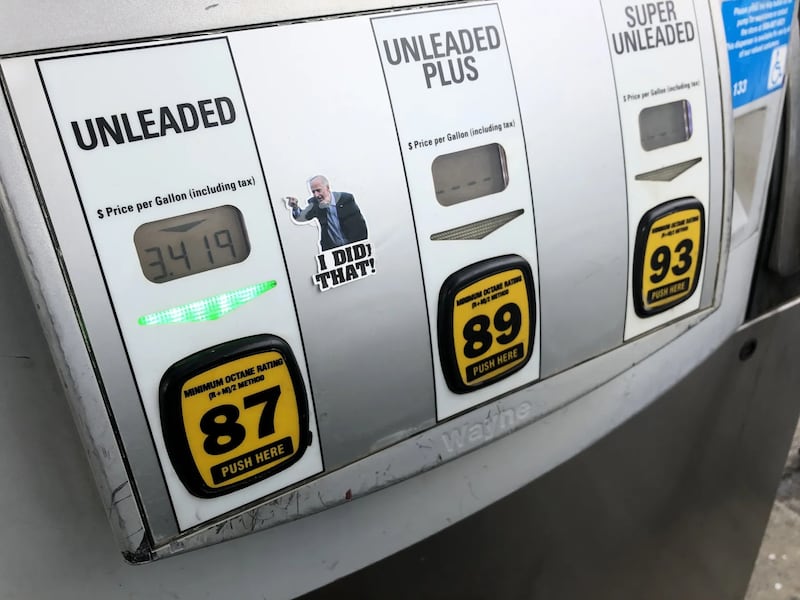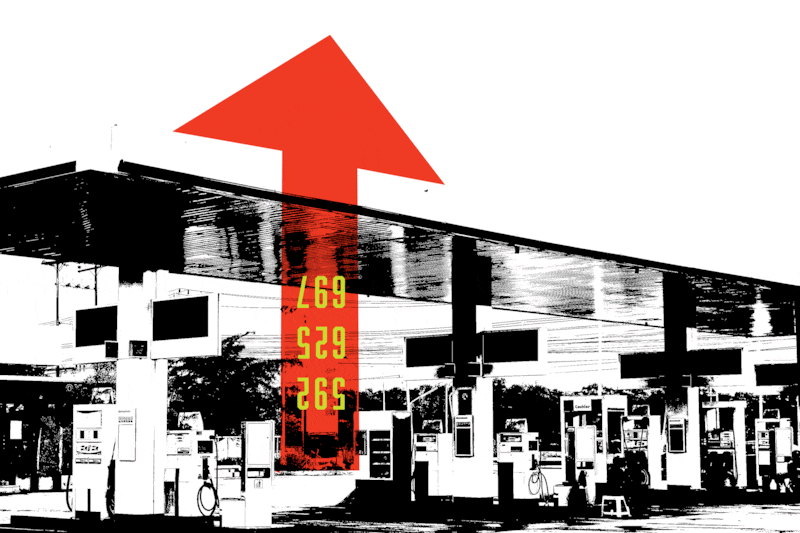A few months ago, when gas was a mere $3 or so a gallon, stickers started showing up on gas pumps that showed President Joe Biden pointing to the price. The stickers read “I did that!” and they were a sort of guerrilla warfare against the Biden administration and its policies.
The stickers may be showing up with greater frequency now as sanctions against Russia settle in, including the ban of Russian oil, which the president announced Tuesday.
Although Russian oil comprises about 3% of the crude the U.S. imports, prices are expected to climb even higher with similar bans announced in Europe. If the most dire predictions are correct, and the conflict is sustained, hold onto your wallets. Some experts see $6 a gallon coming.
If that happens, what will the stickers on gas pumps say? Well, there are already “I did that” stickers with images of Vladimir Putin on them for sale, and that’s who Biden chiefly blames. (He spoke of “Putin’s price hike” in his remarks Tuesday.)
But Republicans are right to question an energy policy that looks to countries such as Iran and Venezuela to meet our needs, while refusing to take action to increase domestic production. They argue that Biden’s actions — from shutting down production of the Keystone XL pipeline to banning new drilling on federal land — amount to a war on fossil fuels, and that the administration bowed to progressives’ climate agenda at the expense of jobs and energy independence.
Tuesday’s decision came amid intensifying pressure from both sides of the political aisle. “Americans have rallied to support the Ukrainian people and made it clear we will not be part of subsidizing Putin’s war,” Biden said.
But then, in an unnecessary bit of political theater, the president suggested that gas companies might share some of the blame for higher prices. The war is “no excuse to exercise excessive price increases or padding profits or any kind of effort to exploit this situation or ... American consumers,” he said.
It’s an idea that Biden has suggested before. “Gas supply companies are paying less and making a lot more,” he said in November. He even asked the Federal Trade Commission to investigate whether the companies engaged in “illegal conduct,” charging that they might have engaged in “anti-consumer behavior.”
In fact, some would argue that the administration’s determination to curb use of fossil fuels is anti-consumer behavior. Pete Buttigieg, Biden’s transportation secretary, has taken heat for suggesting that gas prices wouldn’t be a problem if we all had electric cars, which about half of all Americans don’t want and a great many can’t afford.
Buttigieg also raised eyebrows when he seemed to call the Keystone XL pipeline a “permanent solution” to America’s energy needs, but said “we don’t need a permanent solution to an immediate short-term problem.” For many Americans, particularly those who live in Texas and other oil-producing states, there is a disconnect in those words that goes beyond mere semantics.
You can support clean energy and electric cars and still say, like Tesla CEO Elon Musk recently did, “Hate to say it, but we need to increase oil and gas output immediately. Extraordinary times call for extraordinary measures.”
For Biden, rising gas prices are not a personal problem, but a political one that began dogging him last year. Last spring, for example, House Minority Leader Kevin McCarthy spoke of gas costing an “astounding $3.10” a gallon and said Biden was responsible. (The Associated Press fact-checked the GOP claims and said that increased demand and a cyberattack on the Colonial Pipeline were to blame.)
But Biden is right to worry about how pain at the pump will affect his presidency and, more broadly, the performance of Democrats in upcoming elections. The energy crisis of the 1970s dogged three presidents: Richard Nixon, Gerald Ford and Jimmy Carter. “Watergate is what doomed Richard M. Nixon, but the energy crisis was really the nail in the coffin,” Princeton University historian Meg Jacobs told The Washington Post.
Ford and Carter tried to solve America’s energy problems in part by getting Americans to use less gas, an unappealing strategy once described by The Boston Globe as “Pay more, buy less.”
Carter was, Kevin Mattson noted in Slate last year, “the last president who called for Americans to stop consuming so much.” So at least in all the finger-pointing yet to come, American families likely won’t be blamed if energy costs continue to soar.
But keep your eye on the price of a barrel of oil, which hit an all-time high of $147.50 in July of 2008. Some analysts are saying it could now surge as high as $185 a barrel. If that happens, don’t just hold onto your wallets, but also your bikes.




